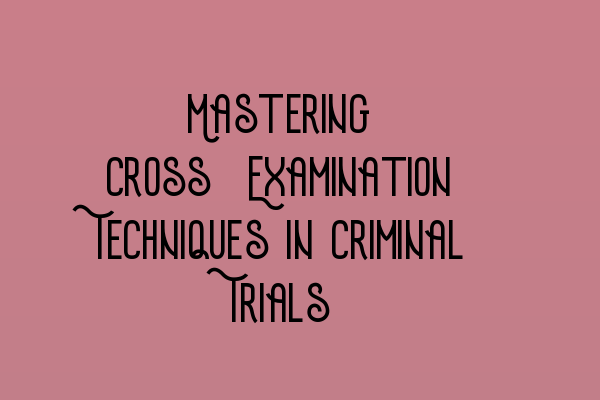Mastering Cross-Examination Techniques in Criminal Trials
In the world of criminal law, cross-examination is one of the most critical components of a trial. It is during cross-examination that the defense has the opportunity to challenge the credibility and reliability of the prosecution’s witnesses. A skilled cross-examiner can greatly influence the outcome of a criminal trial by carefully questioning the witnesses and uncovering inconsistencies in their testimony.
Mastering the art of cross-examination requires a deep understanding of the legal principles and techniques involved. In this article, we will explore some essential strategies that can help criminal law practitioners excel in cross-examination.
Prepare Thoroughly
Preparation is the key to a successful cross-examination. Before stepping into the courtroom, it is crucial to thoroughly review the case materials, including witness statements, police reports, and any other relevant evidence. Familiarize yourself with the facts of the case and identify the strengths and weaknesses of the prosecution’s case.
Additionally, it is essential to craft a comprehensive cross-examination plan. Outline the key points you wish to address and develop a line of questioning that will enable you to challenge the witness effectively. Anticipate the responses that the witness may give and prepare suitable follow-up questions.
Establish a Rapport
Building a connection with the witness can be advantageous during cross-examination. Begin by asking non-threatening and open-ended questions to establish a rapport. This will help to put the witness at ease and encourage them to provide more detailed responses.
However, be cautious not to establish such a strong rapport that the witness becomes overly comfortable and potentially less guarded in their answers. Maintain a professional demeanor and always stay focused on your objectives.
Control the Narrative
During cross-examination, it is essential to take control of the narrative and frame the witness’s testimony in a way that benefits your client’s case. Ask leading questions to guide the witness towards the points you wish to emphasize. By controlling the flow of information, you can help shape the jury’s perception of the case.
Use the witness’s own words against them whenever possible. Quote directly from their previous statements or highlight any inconsistencies between their testimonies and other evidence. This not only undermines their credibility but also strengthens your client’s position.
Listen Attentively
Active listening is a crucial skill during cross-examination. Pay close attention to the witness’s answers and observe their body language for any indications of deception or inconsistency. If the witness provides an unexpected response, be prepared to adjust your line of questioning accordingly.
Make sure to take notes during the witness’s testimony to help you remember important details and catch any contradictions. These notes can also serve as a valuable reference during closing arguments.
Stay Calm and Objective
Remaining calm and composed throughout the cross-examination is essential for success. Avoid becoming confrontational or argumentative, as this can alienate the jury and reduce your credibility. Instead, maintain a respectful and professional demeanor, even when challenging the witness’s credibility.
Focus on the facts and stick to your prepared questions. It is important not to get sidetracked by emotional or irrelevant arguments. By staying objective and focused, you can effectively undermine the witness’s testimony and strengthen your client’s case.
Conclusion
Mastering the art of cross-examination is a skill that takes time and practice to develop. By thoroughly preparing, establishing a rapport with the witness, controlling the narrative, actively listening, and staying calm and objective, criminal law practitioners can enhance their ability to challenge the prosecution’s witnesses effectively.
For more information on criminal law and related topics, please check out the following articles:
- Legal Representation for Delaware LLCs in the UK: Expert Advice
- Ensuring Ethical Business Practices: Delaware’s Code of Conduct
- Legal Challenges for UK Businesses in the U.S.: Strategies for Overcoming Hurdles
- UK Criminal Law: An In-Depth Analysis of the British Legal System
- Legal Challenges for UK Businesses in the U.S.: Strategies for Overcoming Hurdles
